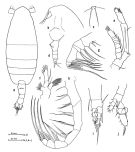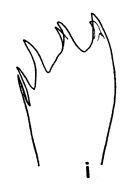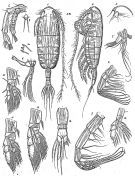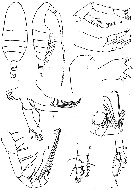|
|
 |
|
Calanoida ( Order ) |
|
|
|
Arietelloidea ( Superfamily ) |
|
|
|
Augaptilidae ( Family ) |
|
|
|
Euaugaptilus ( Genus ) |
|
|
| |
Euaugaptilus mixtus (Sars, 1907) (F) | |
| | | | | | | Syn.: | Augaptilus mixtus Sars, 1907 a (p.22, Descr.F);
Euaugaptilus propinquus Sars, 1920 c (p.17); 1925 (p.297, figs.F); Rose, 1933 a (p.230, figs.F); Sewell, 1948 (p.505); Vives, 1970 (p.554); 1972 (p.221); Matthews, 1972 (p.39); Tanaka & Omori, 1974 (p.248, figs.F, Rem.); Deevey & Brooks, 1977 (p.156, tab.2, Station "S"); Vives, 1982 (p.294); Matsuura & al., 2010 (p.2098, Table 2, 3, fig.8) | | | | Ref.: | | | Lysholm & al., 1945 (p.38); Matthews, 1972 (p.37); Hulsemann, 1967 (p.163, Descr.F, Rem.); Roe, 1972 c (p.1035: Rem.); 1975 (p.358, Descr.F, figs.F, Rem.); Vives & Shmeleva, 2007 (p.204, figs.F, Rem.) |  issued from : O. Tanaka & M. Omori in Publs Seto Mar. Biol. Lab., 1974, XXI (3/4). [p.249, Fig.26]. As Euaugaptilus propinquus. Female: a, habitus (dorsal); b, head (lateral); c, rostrum (frontal view); d, last thoracic segment and urosome (lateral left side); e, A2; f, Mx1; g, Mx2; h, Mxp; i, P1; j, P5. Nota: The urosome segments and furca are in the proportional lengths as 47:12:18:23 = 100. Prosome and urosome are in the proportional lengths as 75:25. Furca 1.5 times as long as wide. The present specimen differs from the description and figures of Sars (1925).
|
 issued from : O. Tanaka & M. Omori in Publs Seto Mar. Biol. Lab., 1974, XXI (3/4). [p.200, Fig.3,i]. As .
Female: i, mandibular teeth.
|
 Issued from : G.O. Sars in Résult. Camp. Scient. Prince Albert I, 69, pls.1-127 (1924). [Pl.CII, figs.1-14]. As Euaugaptilus propinquus. Female: 1, habitus (dorsal); 2, idem (lateral left side); 3, forehead (lateral); 4, rostrum; 5, A2; 6, Md; 6a, Md (masticatory edge of the same appendage, enlarged); 7, Mx1; 8, Mx2; 9, Mxp; 10, P1; 11, P2; 12, P3; 13, P5; 14, urosome.
|
 issued from : K. Hulsemann in Crustaceana, 1967, 12 (2). [p.164, Figs.1-11]. Female (from N Azores; specimen from Lysholm & Nordgaard collection): 1-2, habitus (dorsal and lateral, respectively); 3, forehead with rostrum (lateral); 4,A2; 5, Md (mandibular palp); 6, Md (biting edge); 7, Mx1; 8, Mx2; 9, Mxp; 10, P1; 11, P5. Nota: The present specimen differs from the description of Sars (1907) in the somewhat longer A1. Head and 1st thoracic segment separate, 4th and 5th fused.urosome less than one third of length of cephalothorax. Genital segment slightly longer than the two following segments together. Anal segment longer than preceding. caudal rami as long as anal segment. A1 25-segmented, exceeds end of caudal rami by nearly 3 segments; Exopod of A2 about as long as 1st endopodal segment, 8-segmented (segments 7 and 8 partly fused). Mx1 with 3rd inner lobe and endopod lacking; 2nd inner lobe and 2nd basipodal segment each with 1 seta; exopod with 6 setae, the strongest two situated distally; external lobe with 5 setae. Mx2 with on first six lobes: 2, 1, 2, 2, 2, 1 setae; Mxp with on first two segments: 1, 2 (1 on the fig.9 !), 3, 2, 2 setae; long setae on endopods of Mx2 and Mxp equiped with buttons. 2nd exopodal segment of P1 with short external spine.
|
 issued from : H.S.J. Roe in Bull. British Mus. (Nat. Hist.) Zool., London, 1975, 28 (7). [p.359, Fig.29, h-o]. Female: h, habitus (dorsal); i, forehead and rostrum (left lateral side); j, A2; k, mandibular palp of Md; l, mandible blade; m, Mx1; n, Mx2; o, Mxp. Bar scale 0.1 mm unless indicated.
| | | | | Compl. Ref.: | | | Roe, 1972 (p.277, tabl.1, tabl.2); Vives, 1982 (p.294); Lozano Soldevilla & al., 1988 (p.60); Shih & Young, 1995 (p.68); Fernandes, 2008 (p.465, Tabl.2); Galbraith, 2009 (pers. comm.) | | | | NZ: | 7 | | |
|
Distribution map of Euaugaptilus mixtus by geographical zones
|
| | | | | | | | | | Loc: | | | Cape Verde Is., Canary Is., off Morocco-Mauritania, off Portugal, off N Azores, off Bermuda (Station "S"), Bay of Bengal (in Fernandes, 2008), Indonesia (Celebes Sea), China Seas (South China Sea), Japan, Vancouver Is. | | | | N: | 12 | | | | Lg.: | | | (1) F: 3,9; (8) F: 3,8-3,5; (68) F: 4; (199) F: 3,8-3,5; {F: 3,50-4,00} | | | | Rem.: | meso-bathy-abyssopelagic. Known to occur at a depth of 1000 m, possibly also deeper (Matthews, 1972). Sargasso Sea: 1000-1500m (Deevey & Brooks, 1977, Station "S", as E. propinquus);
According to Roe (1975, p.358 and 360) there is no essential difference between E. mixtus and E. propinquus and that they are synonymous, contrary to Hulsemann (1967).
For Hulsemann (1967, p.165) this species is closely related to E. propinquus but the two species may be distinguished as follows: 1- In dorsal view the forehead of E. mixtus is more evenly rounded than that of E. propinquus; 2- The teeth on the Md blade in E. mixtus are divided into groups of 2, 1 and 3 teeth, in E. propinquus the teeth are divided into of 2 each. 3- Mx1 of E. mixtus has 1 seta on the 2nd basipodal segment and 6 large setae on the exopod, in E. propinquus there are 2 setae on the 2nd basipodal segment and 5 large and 1 minute setae on the exopod.
First occurrence in Indonesian waters by Matsuura & al., 2010 (as E. propinquus).
In ''affinis"" Group after Matthews (1972, p.64) {See remarks in Euaugaptilus genus} | | | Last update : 18/08/2018 | |
|
|
 Any use of this site for a publication will be mentioned with the following reference : Any use of this site for a publication will be mentioned with the following reference :
Razouls C., Desreumaux N., Kouwenberg J. and de Bovée F., 2005-2025. - Biodiversity of Marine Planktonic Copepods (morphology, geographical distribution and biological data). Sorbonne University, CNRS. Available at http://copepodes.obs-banyuls.fr/en [Accessed November 30, 2025] © copyright 2005-2025 Sorbonne University, CNRS
|
|
 |
 |








